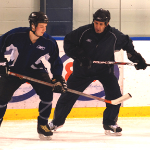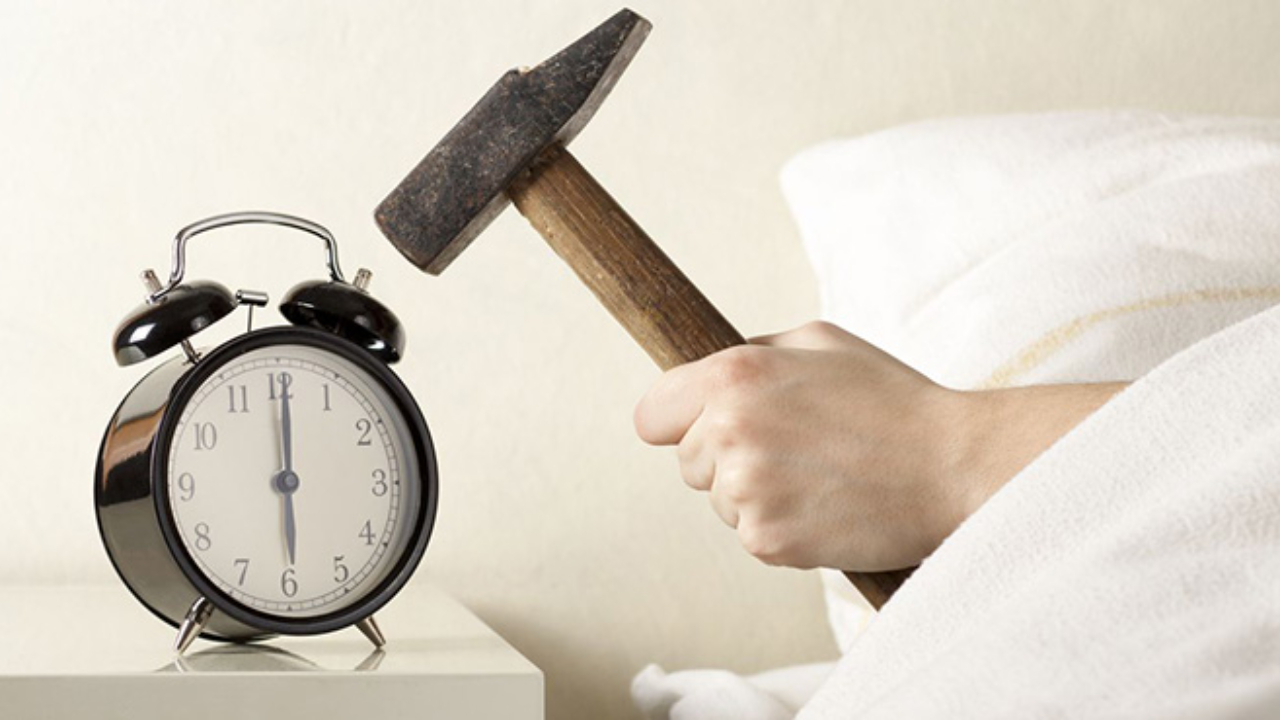
“Athletes may be able to optimize training and competition outcomes by identifying strategies to maximize the benefits of sleep.”
Sleep is the forgotten component of performance enhancement for players. Without proper quality and quantity of sleep, it is hard to improve, or maintain, high level hockey performance. However, there is compelling evidence that when players do get enough sleep, their performance, training, and recovery will improve. We want sleep to be our players’ best friend and their most important training partner.
Overview of Healthy Sleep
The on-line Merriam-Webster dictionary defines sleep as “the natural periodic suspension of consciousness during which the powers of the body are restored.” There are five stages of sleep through which we cycle during the night in a pattern called ‘sleep architecture.’ Within the sleep architecture there are approximately 6 – 8 cycles each lasting 1 – 1.5 hours. We start in stage one then cycle through stages 2, 3, 4, and 5 until we go back into stage one again, and the cycle repeats for the duration of the night until we wake up in the morning.
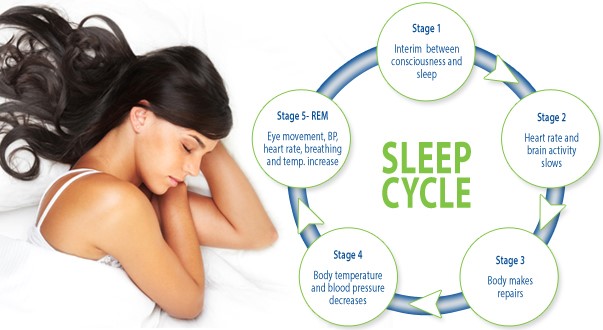
In stage one, the body starts to lose muscle tone, the muscles twitch, and there is a loss of self-awareness. Stage two is a light dreamless sleep with a loss of nearly all muscle tone, and brain activity, heart rate, and breathing slow down. Stage three is the beginning of deep sleep and human growth hormone starts to be released. Stage four is the deepest sleep, and is important because it replenishes physical and mental energy. The body does most of its repair work in stages three and four because of the release of human growth hormone. Stage five is also called “Rapid Eye Movement,” or REM sleep, because the eyes dart back and forth in this stage. Dreaming is done in REM sleep. Dreaming is important for healthy brain functioning, providing energy to the brain and body, and the creation of long-term memories.
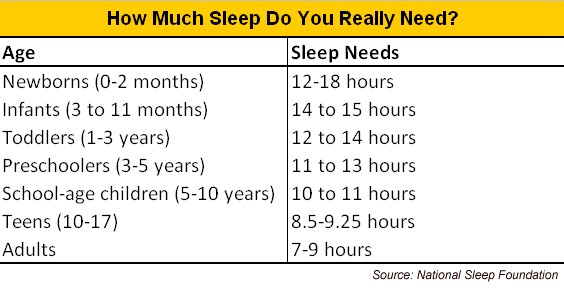
Can Getting More Sleep Improve Sports Performance?
It could be argued that proper sleep each night is what improves the ability to train hard and improve sports performance. Cheri Mah, M.D., a physician scientist specializing in sleep at the University of California – San Francisco Human Performance Center and Stanford University, indicates sleep is an important factor for athletes daily training program.
Because of the release of human growth hormone in stages 3 and 4, sleep is referred to as “The Athletes’ Natural Steroid.” Human growth hormone helps maintain and repair muscles that get slightly damaged when players train, practice, and play hard, and is key to improving sports performance. Dr. Mah, is quoted as saying “Sleep is an important factor in peak athletic performance.” In addition, “Athletes may be able to optimize training and competition outcomes by identifying strategies to maximize the benefits of sleep.”
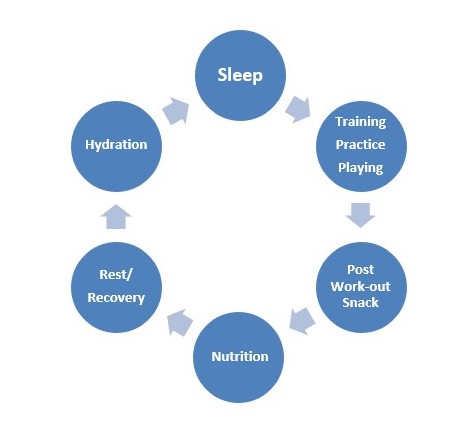
Source: Mike Bracko’s PowerPoint
Research on the effect of improved sports performance after getting more sleep is done by testing athletes on performance when they are getting their normal amount of sleep (six to eight hours), then increasing their sleep to nine to 10 hours. After six to seven weeks the athletes are tested again. In one of the most recent sleep/sports performance studies, researchers studied seven female and five male college tennis players. The researchers wanted to see if serving accuracy improved after getting more sleep. In fact, serving accuracy improved by 6.10%.
Dr. Mah has done a lot of research on athletes, sleep, and performance. In one study she looked at the effect of getting more sleep on 11 male college basketball players who were tested on an agility sprint test (baseline to half-court, back to baseline, then full-court, and back to baseline), how many free throws they hit out of 10, 3-point shots out of 15, and a self-rating of performance during and after practices and games. After getting more sleep the players improved:
- Agility sprint by 0.70 seconds
- Free throws by 9%
- 3-point field goals by 9.2%
- Self-rating (1 – 10) during/after practices improved 6.9 to 8.8
- Self-rating during/after games improved 7.8 to 8.8.
Dr. Mah also studied seven Stanford University football players. They were tested on 20-yard shuttle run, 40-yard dash, and daytime sleepiness and fatigue before and after getting more sleep. The players improved:
- Ran the shuttle run 0.10 seconds faster
- Ran the 40-yard dash 0.10 seconds faster
- Daytime sleepiness and fatigue scores decreased significantly
In another study, Dr. Mah studied college swimmers who were tested on 15-meter swim sprint time, reaction time off start blocks, swim turn time, and number of kick strokes over 15-meters before and after sleep extension. After getting more sleep the swimmers improved their performance accordingly:
- 15-meter sprint = 0.51 seconds faster
- Reaction time off start blocks = 0.15 seconds quicker
- Turn time = 0.10 seconds faster
- Kick strokes increased by 5.0 kicks.
Charles Samuels, M.D., of the Center for Sleep and Human Performance in Calgary, AB., indicates there is an important relationship between physical recovery during sleep and an athlete’s ability to train at maximum capacity with optimal results.
How does sleep improve the performance of players?
Getting good quality and quantity of sleep enhances performance by improving mental function, reaction time, hand-eye coordination, concentration, increased energy, and improved mood. Sleep also helps athletes recover from training, practices, and games. There is an important relationship between recovery during sleep and an athlete’s ability to train at maximum capacity. Quality sleep also improves motivation, judgment, and attention. Sleep experts indicate it is the sleep after a game or practice that enhances skill development.
Tips to help players get better sleep
- Turn off cell phones, iPads, and laptops 1 – 2 hours before bed. The blue light from cell phones, iPads, and laptops interferes with the secretion of melatonin, which will make it harder for a player to fall asleep. Melatonin is a hormone that makes us sleepy.
- Decrease the temperature in the bedroom. The body likes cooler temperatures for better sleep. Set the temperature to 18 – 20 C, but it could be as low as 15 C. The bedroom should be like a tomb – cold, dark, and quiet.
- Take a hot bath or shower 90 – 120 min before bed. The body temperature drops quickly after a hot bath or shower which helps sleep.
- Evaluate and address bedroom factors, such as:
- Reduce noise or wear ear plugs
- Use black out curtains
- Use a reliable, effective alarm clock
- Sleep on a good mattress and pillow
- Make sure doors and windows are closed and locked (unless a player likes fresh air or it is too hot in the bedroom).
- Have a pre-bed-time ritual to relax. Turn off electronics, meditate, stretch, and maybe have a snack that will help with sleep.
In conclusion, when players do not get enough sleep they can suffer the consequences of poor performance, decreased ability to train hard, and inability to recovery from training. When players do get enough sleep their training, practice and game performance can improve, and they will recover better and be ready for the next day’s training, practice, or game.
